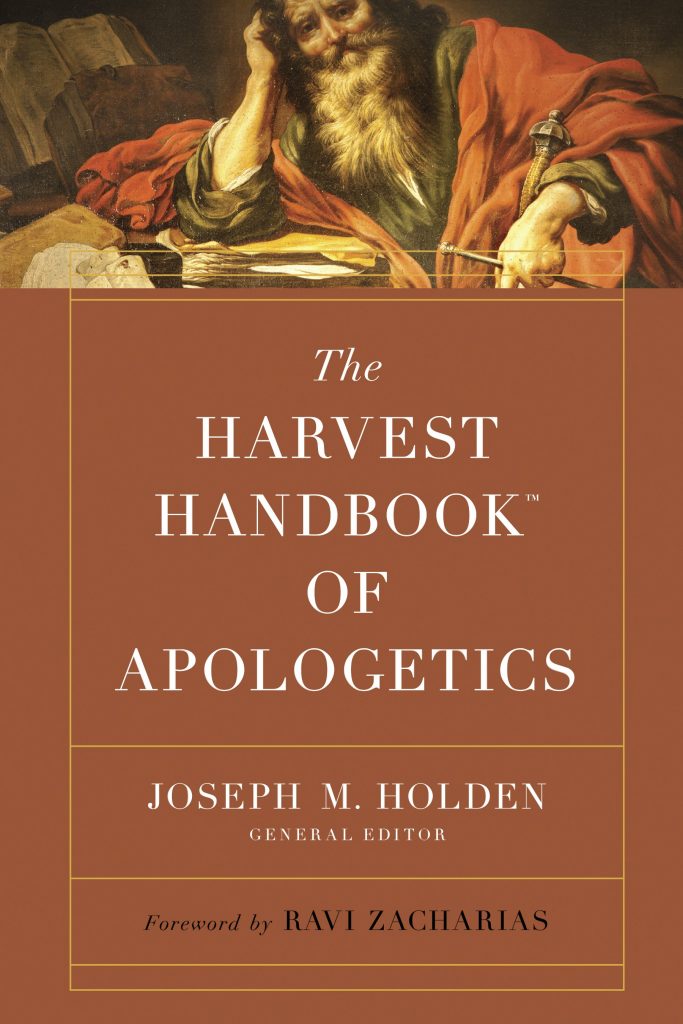A Review of
The Harvest Handbook™ of Apologetics
Joseph M. Holden, General Editor

Release Date: February 2019
Page Count: 528
Size: 6 x 9
Binding: Hardcover
ISBN: 978-0-7369-7428-8
Harvest House | Amazon.com | ChristianBook.com
To begin with, The Harvest Handbook™ of Apologetics feels good in the hand. It’s big–but not too big. “Now that’s a real book!” said one of the elders of my church as I presented a copy to him. The paper is pleasant and so is ink–delightful! All at a very good price for a 6×9 hardcover of 528 pages. The wide array of subjects it weighs in on in its seventy five chapters is thrilling. This makes it a great reference work and also makes it a great way to start to catch up on some of the apologetic fronts we’re either rusty or weak on. Whether scanning the table of contents, flipping through the book and seeing random words and section headings, or trying to judge it by its bibliography, or enjoying my first speed read, I was a big-eyed kid in the candy store. This book has the degree of quality—both in the tangible qualities and in the intellectual smorgasbord inside—to make it the type of book I am eager to plunge into myself and give as gifts to others. After having a chance to peruse my free review copy, which is the only “payment” made for the agreement to make a review like this, I purchased 25 more copies to give to family, friends, and church leaders.Who is the Guy with the Sword?
The cover art is attention arresting. Who is this guy with the steely gaze, flowing cloak, muscular forearms, and unsheathed sword at the ready? Did he just get back from a Renaissance Festival or from a Jedi Knight convention? No. He seems to be guarding stacks of parchment and books. Ahh, it’s a representation of the Apostle Paul. This is the painting of “Saint Paul Reclining” by Renata Sedmakova. It turns out that artistic tradition tends to depict the Paul with a receding hairline, a long beard, rather European features, and, last but not least, a sword. Regardless of whether Paul actually carried a sword with him on his many travels or not, the sword still serves as an apt symbol for a man of many militant metaphors. For Paul, the “word of God” was the “sword of the Spirit,” his coworkers were “fellow soldiers,” the normal Christian life for us all was about “standing firm” in “the whole armor of God” while under siege, and his mission was “the defense of the gospel” which used “divine power to destroy strongholds, arguments, and every lofty opinion raised against the knowledge of God and take every thought captive to Christ.” The Harvest Handbook of Apologetics (HHA) carries on the same mission–the mission of defending of the Christian faith. The target audience of HHA is not just those who enjoy apologetic resources; it is written for ALL of Christ’s followers. The 1 Peter 3:15 imperative for everyone honor Christ the Lord as holy by “always being prepared to make a defense (apologia) to anyone who asks you for a reason for the hope that is in you. . . with gentleness and respect” is either quoted or referenced fifteen times in HHA’s 500 pages! HHA is a fresh, new, and almost encyclopedic resource geared to help us all become better prepared to defend our hope. In a day where perhaps over 60% of all young people in North America who are accustomed to church attendance end up leaving the Church as they become young adults and where 10% of those also lose their faith entirely, could it be that Christians have neglected the defense of the faith too long?Not Just Historically Reliable but Totally Without Error
One thing that makes this book unique among apologetics books is that it defends the basic historical reliability of the gospels, as most good apologetics books today do, and then proceeds to go the extra mile to unapologetically commend and defend the doctrine of inerrancy. Quite a few of the chapter authors either signed the Chicago Statement on Biblical Inerrancy, signed The Bible Petition, and/or teach at evangelical schools that have a strong statement affirming Biblical Inerrancy in their doctrinal statements. Several chapter authors have contributed articles to DefendingInerrancy.com or are part of the DI team–F. David Farnell, Phil Fernandes, David Geisler, Norman Geisler, Christopher Haun, Joseph Holden (the editor of HHA and general editor of DI), Richard Howe, and Douglas Potter. This book has inerrancy stamped over it in several places. In Chapter One, Norm Geisler, who served the Church for ten years in the International Council on Biblical Inerrancy, helping to draft all three of the Chicago Statements, editing all of the other ICBI publications, and later defending their legacy, sets the tone for the book with the twelve steps that show Christianity is true that he is famous for. What many may not realize is that in his twelve-point schema, Norm works his way from the foundational question of whether anything can be known at all and doesn’t rest his case until giving the reader a sense of the need to adopt Jesus’s own view of the Bible as the word of God, as true to the chagrin of any truth claim from any source that might contradict it, authoritative, inspired, imperishable, unbreakable, supreme, infallible, reliable, accurate, and inerrant. In Chapter Six, Richard Howe discusses theories of truth with a focus on how ones view of truth may undermine his doctrine of inerrancy. In Chapter 33, Norm makes a case for there being no logical or factual contradictions in the Bible. In Chapter 56, Richard Howe explains how philosophy and inerrancy relate. Even if there may be a few chapters written by authors who might hesitate on some article of the Chicago Statement on Biblical Inerancy and Chicago Statement on Biblical Hermeneutics, this book is very inerrancy friendly. And of course every chapter in the book indirectly supports inerrancy by arguing that the Bible got it right where many others go astray. Some apologists say that biblical inerrancy is a peripheral matter when doing apologetics and evangelism–a matter to bring up much later during discipleship rather than in the early stage of trying to get them to believe the basic facts about Jesus. There is some truth to this claim. We agree that inerrancy shouldn’t be pushed as a must-believe for saving faith or even as a test of orthodoxy. But biblical inspiration and inerrancy are only peripheral in the same sense that the flaps which steer airplanes and the rudders that steer ships are peripheral–peripheral in a way that matters immensely in the long-term destinations. While an apologist can do a great deal of defending of the Christian faith without being a full inerrantist, how much of the Bible has to be true in his or her overarching defense before he or she ceases to be a force for belief in the Bible-based faith and becomes instead an antagonist and detriment to that faith? If an apologist, for example says, 98% of the propositional statements in the bible are true, and 2% are sincere but mistaken, is he really still an apologist? What about 90% true and 10% false? 70%:30%?? 51%:49%??? Where do we draw the lines for apologists and apologetic systems? At what point are we willing to call out with gentle rebukes and correction an apologist who has become a partial apologist? Asking the same thing in a slightly different way, what is the acceptable ratio of silver to dross in a defense of the historical, orthodox, and biblical faith? It is a good time to start figuring these things out because the old lines are being trampled and there is no sign that this trend is changing. Apologists who are full inerrantists of course prefer an apologetic that says, as Norm’s 12-point schema does, that there are no factual or logical errors in the Bible whatsoever–and indeed that because of a strong doctrine of inspiration, errors are not even possible. And, regarding dross acceptance levels, we agree with David who urged the Israelites to sing with him,The words of the Lord are pure words,
like silver refined in a furnace on the ground,
purified seven times.
(Psalms 12:6)















